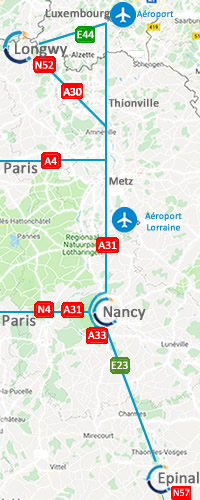A focus on solar energy with the European project RED WoLF
Housing in North-Western Europe is responsible for the emission of 300 million tonnes of CO2 per year. To meet the European Union's objectives of reducing carbon emissions and increasing the use of renewable energies, the European project RED WoLF - Rethink Electricity distribution Without Load Following - was launched in January 2019 for a period of 3.5 years. Funded by the Interreg North West Europe programme, it brings together 14 partners from the United Kingdom, France, Ireland, Belgium and Germany: universities, housing organisations, local authorities and energy suppliers.
Eric Rondeau, Jean-Philippe Georges, Sylvain Kubler and Paul Ortiz, researchers in the Green Networking project of ISET department, represent the CRAN in this project coordinated by Leeds Beckett University.
The mission of RED WoLF is to increase the use of renewable energy to reduce CO2 emissions from houses equipped with Photovoltaic panels not connected to Gas (PVnG).
This innovative project will install pilot sites totalling 100 houses in which it will combine solar panels, batteries and thermal accumulators. This will allow households to use their energy locally and store electricity from the grid at times of low demand.
Six pilots in the United Kingdom, Ireland and France
These experimental pilot sites will be located in three different countries (United Kingdom, Ireland and France), with different technologies for each of them. In total, 100 houses will be equipped with Hybrid Storage Systems merging batteries and thermal accumulators.
The objective of these 100 pilot houses is to reduce their CO2 consumption by 215 tonnes per year.
Last May, Enedis, Néolia, Lancey, EDF and the University of Lorraine met in Montbéliard (Franche-Comté) in one of the pilot sites managed by Néolia to develop the necessary action plan to equip the 14 houses currently equipped with electric heaters.
On the agenda: questionnaires for residents about their current consumption, online smart electricity meters, installation of photovoltaic panels on each roof. An electric heater with integrated electrical storage and a centralized battery capable of powering all electrical appliances in the house and storing energy produced by solar panels as well as low-carbon energy (wind and solar) from the national grid during periods of low demand will also be installed.
The expertise of the CRAN and the University of Lorraine in responsible digital technology
CRAN will contribute its expertise in the development of new methods based on analytical models, networks simulations and experimental platforms for the design of renewable energy management networks.
The laboratory will work in close collaboration with Leeds Beckett University to develop the software that will smartly conduct electricity from the photovoltaic panel and the grid to the thermal and electrical tanks of Hybrid Storage Systems, in order to optimize battery management.
The objective of our researchers is to code the software step by step, gradually integrating different factors such as the indoor environment, weather forecasts, carbon emissions, residents' behaviour, etc. The crucial point in this task is to make the devices fully open so that they can be controlled remotely.
The project was launched on 15 and 16 May at the University of Leeds, and the pilot sites are currently being deployed.
In the long term, RED WoLF aims to expand the number of sites where this system will be deployed to best disseminate this technology.
More information about RED WoLF project:






